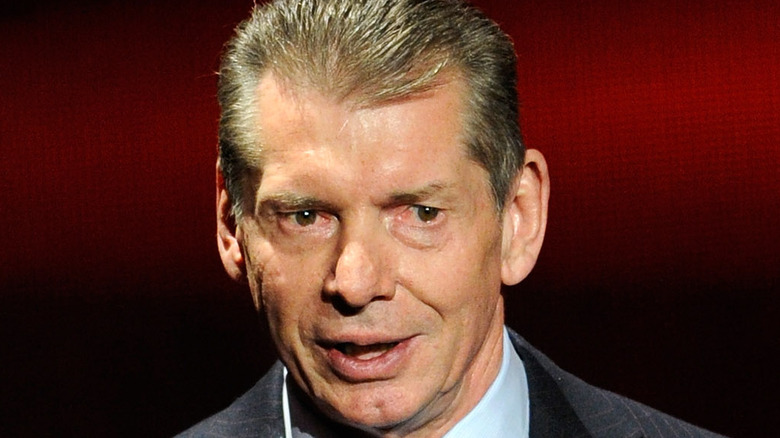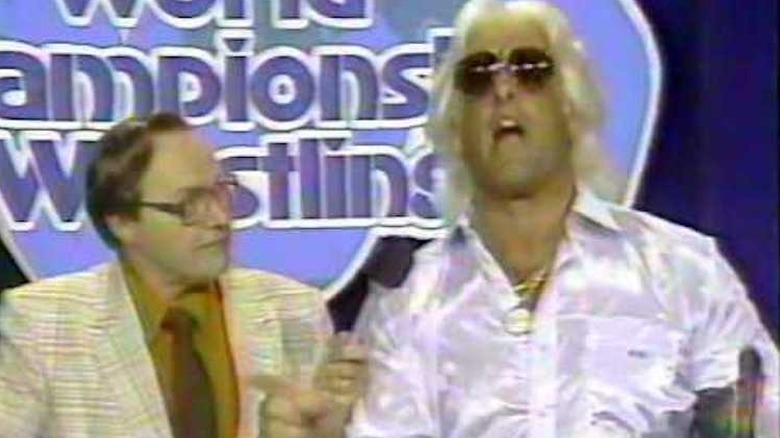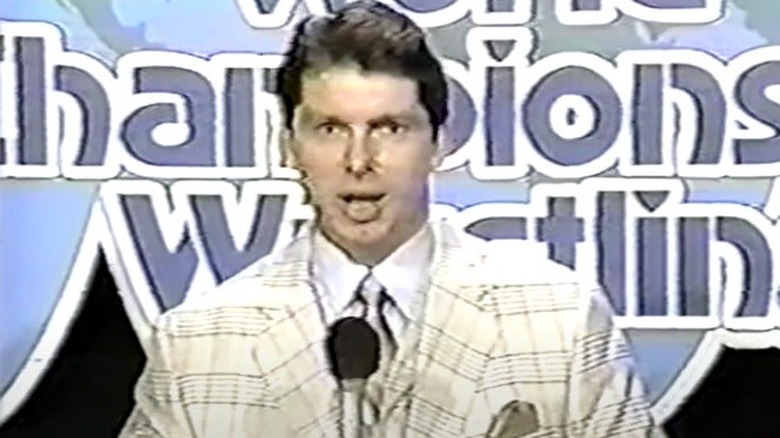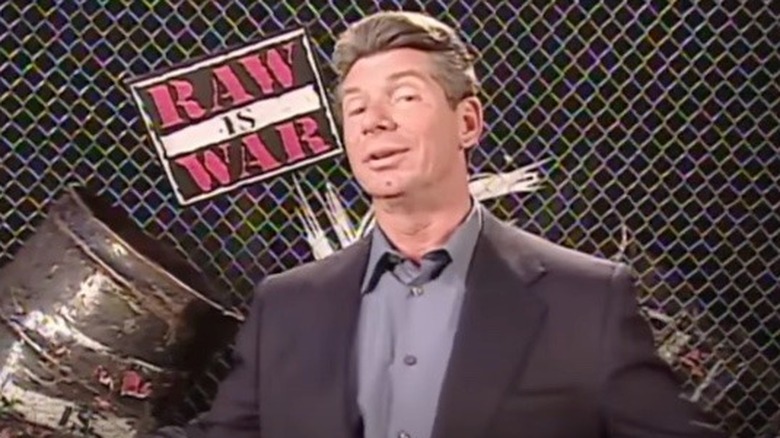Why Was Black Saturday So Important For Vince McMahon And The WWE?
You can't talk about the WWE without at least one mention of the company's owner and chairman, Vincent Kennedy McMahon. Known to friends and family as Vince and known on-screen as the oftentimes devious authority figure Mr. McMahon, the billionaire businessman is still in a class of his own as a wrestling promoter, having overseen so many eras in the sport and guided the careers of top guys from Hulk Hogan in the 1980s to Roman Reigns in far more recent years. Sure, he's been frequently derided for having what many feel is a dated creative vision and for his eccentricities behind the scenes — the late Brodie Lee (formerly Luke Harper in WWE) expertly parodied the latter in his early AEW vignettes. But you can't argue with the man's success and the fact he's still running the show as he draws closer to his 80th birthday.
Well before McMahon was getting blasted for being "out of touch" and lampooned for his apparent real-life quirks, most fans knew him as the energetic announcer and interviewer who cheered for the good guys and often screamed bloody murder whenever he'd see heels blatantly cheating or brutally attacking their babyface rivals. In an era where kayfabe was still alive and well, very few were aware that McMahon was, in fact, the owner of WWE, and we'd venture to say even fewer expected what happened in the years following the moment now known as "Black Saturday."
Before Black Saturday: Wrestling followed the territorial system
Nowadays, we're familiar with the basic hierarchy among wrestling promotions in the U.S. You've got the big names like WWE and AEW on top, with a plethora of independent promotions that typically serve as a launching pad for young talents before they get signed by the major companies. But way back in the early 1980s, wrestling still followed the territorial system (via TheSportster), which meant different U.S. (and Canadian) regions had their own promotion that wouldn't encroach on other territorial companies. Wrestlers could move from one promotion to another, but with the National Wrestling Alliance (NWA) strictly governing the territories, it was imperative for companies under their umbrella to hold shows exclusively in their home territory.
For many decades, that was how the wrestling business worked in North America, but the relatively young Vince McMahon wanted to buck those traditions. On June 6, 1982, the then-36-year-old purchased the WWE (then the WWF) from his father, Vincent J. McMahon (aka Vince McMahon Sr.), and started making plans to disrupt the territorial system and transform WWE from a northeastern territory into a nationwide operation. Vince Jr. seceded from the NWA in 1983 and went about his expansion by pirating wrestlers from various territorial promotions and holding shows outside of the region WWE was supposed to cover, much to the NWA's chagrin. But there was more to come from the man who would eventually become the most powerful man in the wrestling industry.
Vince McMahon brought his product to Ted Turner's network, and fans hated it
Aside from signing standouts from other territories such as Rocky Johnson, "Superfly" Jimmy Snuka, and The Iron Sheik (via Last Word on Sports) and promoting events outside of the northeast region, Vince McMahon purchased a couple of television time slots, effectively replacing the shows of territorial promotions with those of his company. These included Texas-based Southern Championship Wrestling's USA Network slot, but the one really worth noting is Georgia Championship Wrestling's Saturday night slot on TBS.
After being rebuffed on his first attempt by TBS head honcho Ted Turner, McMahon turned to his plan B, which was to purchase GCW co-owners Jim Barnett and Jack and Gerald Brisco's shares in the company. As McMahon was now technically GCW's owner, he had that coveted Saturday night time slot, and on July 14, 1984, viewers of GCW's "World Championship Wrestling" were almost immediately greeted by the sight of WWE's youthful owner hyping up his own talents — The Iron Sheik, tag team champions Dick Murdoch and Adrian Adonis, Jesse Ventura, and Big John Studd — and their upcoming matches on the show. This was Black Saturday for GCW fans as they knew it, and it would seem that many of them weren't happy about it.
As explained by TheSportster, the main issue fans had with McMahon's takeover of GCW programming was the fact that his product was predicated on larger-than-life personalities and wacky gimmicks — in other words, sports entertainment before he even started calling it sports entertainment. GCW, on the other hand, was all about presenting wrestling as a legitimate sport. It wasn't long before fans were on the phone to TBS, demanding a return to the "World Championship Wrestling" they knew and loved.
Black Saturday kicked off McMahon and Turner's battle for wrestling supremacy
With WWE's programming on TBS suffering from poor ratings, Vince McMahon tried a different tactic, airing clips from house shows where his big-name stars won easily over local enhancement talents (via TheSportster). As this was not what McMahon promised when he got the Saturday night slot, Ted Turner became even more displeased by the WWE boss' presence on his network. Eventually, McMahon pulled out of TBS and focused his energies on his USA Network programming when he realized his efforts to push his talents on Turner's network were futile, and he sold the "World Championship Wrestling" time slot to Jim Crockett Promotions. By 1988, JCP was seriously in the red, and who else but Ted Turner would step up and buy 65% of its assets for $9 million (via Cageside Seats). Turner then renamed the company after its flagship show and continued its own nationwide expansion under the World Championship Wrestling banner.
It would take another eight years before the "war" between McMahon and Turner truly heated up thanks in large part to the formation of the New World Order, a WCW faction whose original members were ex-WWE Superstars Hulk Hogan, Scott Hall, and Kevin Nash. For close to two years, the nWo's popularity as "cool heels" helped WCW beat WWE's ratings in the "Monday Night Wars" that ensued. However, poor creative and financial decisions led to WCW's ultimate downfall, and Vince McMahon ended up buying WCW in March 2001.
In the two-plus decades since then, McMahon has benefited greatly from the events that were essentially kickstarted by Black Saturday on TBS. But as most wrestling fans know, there's a little company called All Elite Wrestling that's seemingly become WWE's biggest threat since Turner's WCW ruled the Monday Night Wars all those years ago.



